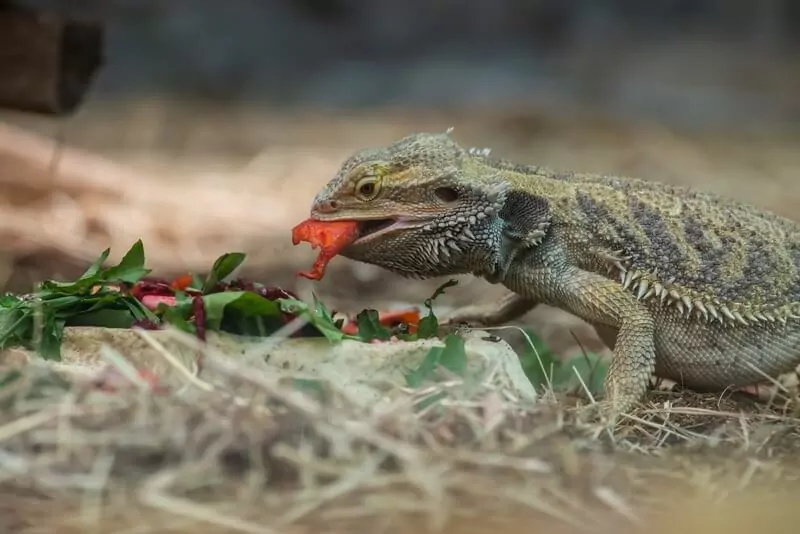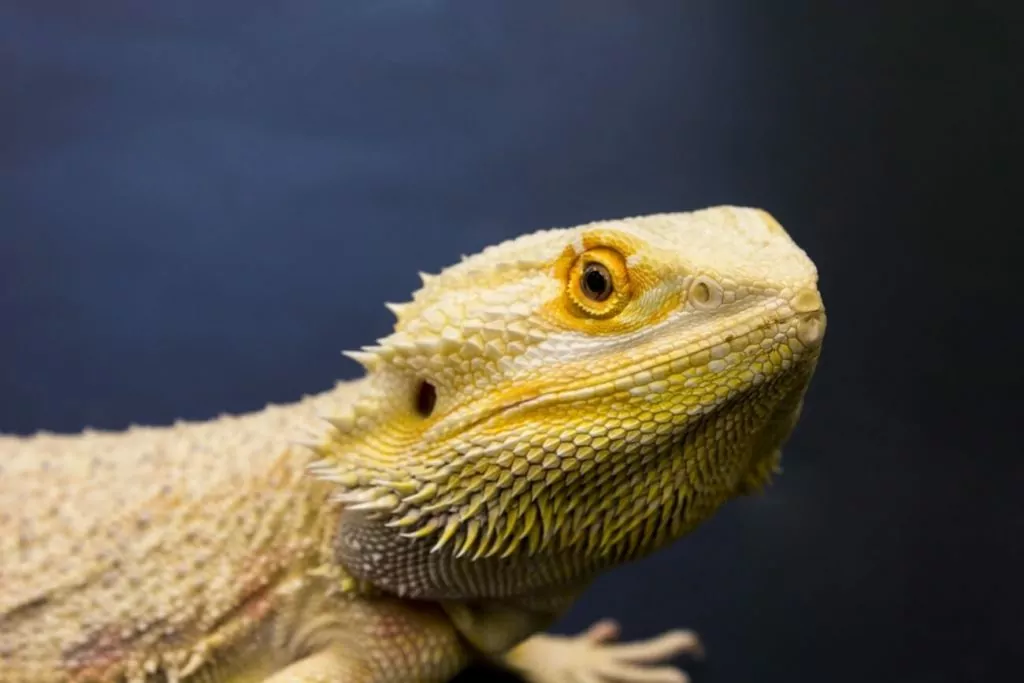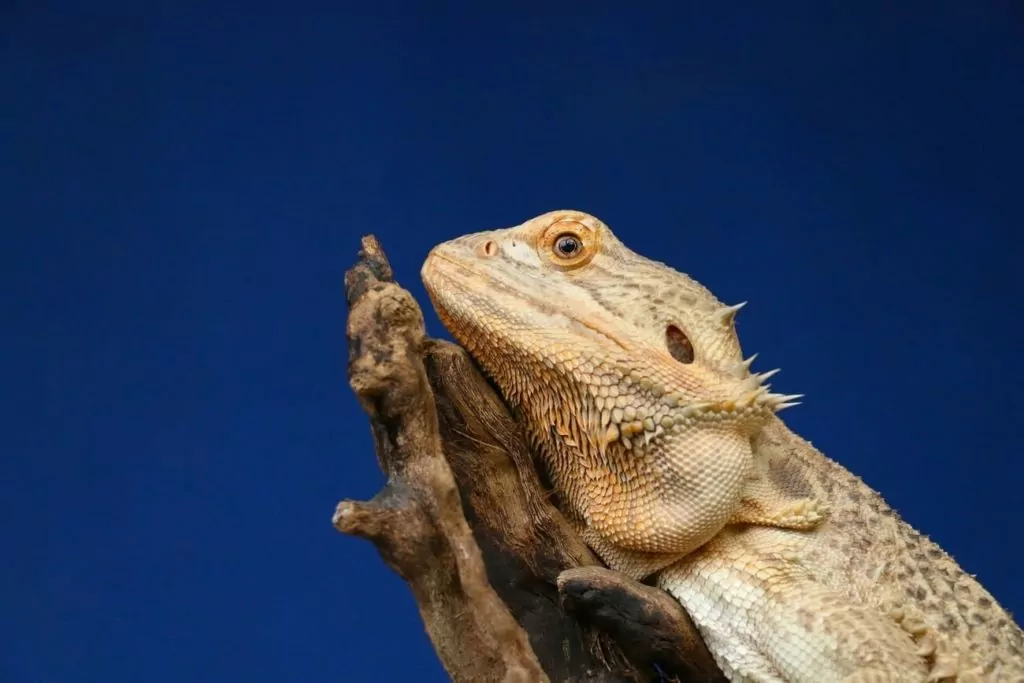Letting your beardie have a tasty watermelon seems like a no-brainer. They’re full of water, taste great, and these lizards love them!
But can bearded dragons eat watermelon without any health issues?
This guide will teach you everything you need to know about feeding these fruits to your pet bearded dragon. It’s not a simple yes/no answer!
Table of Contents
Can Bearded Dragons Eat Watermelon?
Sweet, cooling, and full of hydration, watermelons are a tasty treat that many enjoy during the summer season. If you’re thinking about offering a piece to your pet bearded dragon, most are more than willing to scarf it down! The flavor-filled fruit is enticing to these lizards, but is it safe for them to have?
Bearded dragons can eat watermelons. However, they must do so sparingly.
Watermelons aren’t the most nutritionally dense fruits out there. After all, these melons are about 92 percent water! However, they do have some vitamins and minerals that your beardie can benefit from.
Watermelons contain Vitamin C and beta carotene, which help with reproductive health, immunity, vision, and overall development.
Plus, there’s magnesium and potassium. These minerals can boost metabolism levels and regulate blood pressure, respectively.
How Often Can You Feed Them Watermelon?
Bearded dragons can eat watermelon as an occasional treat. Your pet beardie will typically be able to enjoy the sweet, pink melon every once in a while without experiencing any ill effects.
However, they should not be a part of your bearded dragon’s regular diet.
At most, you can provide one to three teaspoon-sized pieces a month. That’s it. Anything more, and you run the risk of creating some health issues.
Bearded dragons are omnivores that require a varied diet filled with protein and plant-based foods. While watermelons do have some nutrients, it’s not a viable option for sustaining your lizard’s health in the long run.
Beardies have vastly different dietary needs than your own. As a result, even a few pieces of melon could cause trouble.
Expert Tip: Even if you stick to the maximum recommended amount, keep an eye on your lizard after providing watermelon. Monitor their bowel movements to ensure that the fruit isn’t causing any digestive upsets.
Why You Should Limit How Much They Eat
The truth is, even though bearded dragons can eat watermelon, it has no place in their diet beyond being an infrequent snack. There are many reasons why you should limit their watermelon intake.
First of all, these melons don’t have nearly as many nutrients to make an impact on your lizard’s health. There are far better nutritionally dense fruits out there. Watermelon is barely a drop in the bucket when it comes to meeting your pet bearded dragon’s needs.
Another issue is its sugar content. The sweetness is what attracts bearded dragons most, but it can also be a detriment.
Beardies are prone to gaining weight in captivity. Sugary fruits will only exacerbate that problem.
Furthermore, too much sugar can lead to diabetes, tooth decay, and even liver problems. Your lizard’s body simply isn’t capable of processing a ton of sugar, so too much watermelon can be disastrous!
The calcium and phosphorus in watermelon are problematic as well. A cup of the fruit has about 16.9 milligrams of phosphorus and roughly 10.8 milligrams of calcium. There’s more phosphorus in the melon than calcium, which is a massive issue for bearded dragons.
You see, phosphorus makes it impossible for your beardie to utilize the calcium fully. It binds to the calcium, which prevents it from absorbing into the bloodstream.
Expert Tip: Calcium is essential for bearded dragons. Without it, they can suffer from bone disorders, frequent fractures, and a host of other problems. Providing too much watermelon can quickly lead to bone deterioration.
Finally, let’s talk about the moisture content. As mentioned earlier, watermelon is about 92 percent water. While great for giving your beardie a boost of hydration, it can also lead to stomach upsets.
That extra water can do a number on your lizard’s digestive tract! It can cause diarrhea, which only causes more dehydration moving forward. In small amounts, the moisture shouldn’t be too much of an issue. However, letting your bearded dragon have too much watermelon is asking for trouble.
How To Feed Watermelons To Your Bearded Dragon
Ready to give your bearded dragon some watermelon to eat? Providing these sweet treats is pretty straightforward, but it does require a bit of preparation to avoid issues.
Here’s the correct way to feed a bearded dragon watermelon.
Choose A Ripe Melon
Take some time to choose a perfectly ripened one. Sure, your beardie can only eat a few small pieces of watermelon, but those pieces need to be ripe and healthy.
Unripened melons are more fibrous. As a result, they are firmer and more challenging to eat.
On the opposite side of the spectrum, overly ripe fruits aren’t very appetizing. The flavor and texture change, making it unappealing.
Expert Tip: If possible, only let your bearded dragon have organic watermelons. Organic fruits aren’t grown with harsh chemical fertilizers or herbicides. They’re free of potentially harmful residues, which is always better for your bearded dragon.
Remove Seeds
Next, slice the watermelon into manageable pieces and remove the seeds.
You can opt to go for a seedless watermelon variety. However, don’t assume that a seedless melon is entirely devoid of seeds. It’s quite common to still find some stray seeds here and there.
Remove all bits from the watermelon you plan to feed your beardie. That shouldn’t be too difficult, since you’ll only be letting them have a few small pieces.
Chop Into Small Pieces
Bearded dragons can eat watermelon, but the ideal morsel size is only around one teaspoon! Teaspoon-sized pieces are safe and manageable.
Expert Tip: Younger lizards may need pieces that are even smaller, so adjust accordingly.
If this is your first time feeding watermelon, you might want to consider starting with a quarter of a teaspoon. That way, you can ease your pet reptile’s gut slowly and monitor their response. As long as they don’t react negatively, you can work your way up to a teaspoon-sized piece moving forward.
Serving The Watermelon
There are a couple of ways to feed watermelon to your bearded dragon
For most owners, the go-to is to provide it as a treat on its own. Your beardie will quickly gobble it up without any issues!
Alternatively, you can break the pieces into even smaller chunks and include them in a standard meal mix. This technique is an excellent option if your pet lizard is a bit picky.
The sweet aroma and taste are great for enticing them to eat other greens and vegetables.
Should Bearded Dragons Eat Watermelon Seeds?
No, bearded dragons should never eat watermelon seeds.
Always provide seedless pieces. Whether you buy seedless watermelons or not, make sure to inspect the pieces and remove any hard seeds.
Seeds pose a couple of problems. An over-eager lizard can easily choke on larger seeds. Even if they manage to swallow them, the pointed side could scratch their throat on the way down.
Watermelon seeds can also impact the gut. They can block the digestive tract, preventing stool from passing. It’s a serious health issue that requires immediate intervention.
To avoid all those risks, remove every seed before feeding your beardie.
What About the Rind?
Watermelon rinds pose the same risks.
Rinds are tough, super fibrous, and difficult to digest. They can cause impaction, choking, and more.
Make sure to remove all green rinds before letting your bearded dragon have any pieces of watermelon. It’s a good idea to eliminate all traces of white as well. While not as tough as the outer skin, the white part of the rind is still very tough.
Conclusion
Bearded dragons can eat watermelon, but you need to limit their intake and prepare it correctly. But don’t worry, you shouldn’t run into any issues as long as you stick with the recommendations above!
If you have any questions about giving these fruits to your beardie we’re always happy to help. Just send us a message with your question and we’ll get back to you as soon as possible.



